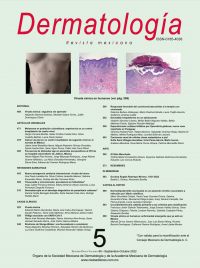Favorable response of basal cell carcinoma to nivolumab therapy.
Dermatol Rev Mex. 2022; 66 (5): 546-551. http://doi.org/10.24245/dermatolrevmex.v66i5.8135
Katerine Berbeo-Velásquez,1 María Paulina Estrada,1 Laura Trujillo-Gaviria,1 Guillermo Jiménez-Calfat2
1 Residentes de dermatología.
2 Dermatólogo oncólogo.
Clínica Vida, Medellín, Colombia.
Resumen
ANTECEDENTES: El carcinoma basocelular es la neoplasia maligna más común, tiene bajo poder metastásico, pero puede ser localmente agresivo. Se ha visto asociación con la mutación de algunos protooncogenes y genes supresores tumorales, lo que puede explicar el mecanismo de acción de algunos inhibidores de la vía Hedgehog y en los últimos años se han administrado los bloqueadores del receptor de muerte celular programada (anti-PD1) para tratar los casos más resistentes.
CASO CLÍNICO: Paciente masculino de 40 años, con diagnóstico de melanoma nodular en la espalda estadio IIIC; se dio manejo quirúrgico, con márgenes negativos y afectación de ganglio no centinela, por lo que se inició terapia coadyuvante con nivolumab. Previo al inicio de ésta, se observó una lesión clínica y dermatoscópicamente compatible con carcinoma basocelular, que mostró una reducción importante de su tamaño después de la terapia coadyuvante.
CONCLUSIONES: Aunque no se vio una respuesta clínica completa del carcinoma basocelular en este caso, sí observamos una respuesta favorable al nivolumab, lo que pone a la terapia con anti-PD 1 en la lista de opciones de tratamiento contra el carcinoma basocelular; sin embargo, es importante tener en cuenta que existen múltiples variables que pueden influir en la respuesta terapéutica.
PALABRAS CLAVE: Nivolumab; carcinoma basocelular; genes supresores tumorales.
Abstract
BACKGROUND: Basal cell carcinoma is the most common malignancy, it has a low metastatic power but can be locally aggressive. The association has been seen with the mutation of some proto-oncogenes and tumor suppressor genes, which may explain the mechanism of action of some inhibitors of the Hedgehog pathway; in recent years anti-PD1 has been used for treating the most resistant cases.
CLINICAL CASE: A 40-year-old male patient diagnosed with nodular melanoma stage IIIC in the back, he underwent to surgical management, negative margins, and non-sentinel node involvement, management started with adjuvant therapy with nivolumab. Before the onset of this, it was described a lesion clinically and dermoscopy compatible with basal cell carcinoma, which presented a significant reduction in size after the beginning of adjuvant therapy.
CONCLUSIONS: Although a complete clinical response of basal cell carcinoma was not seen in this case, we did see a favorable response to nivolumab, which puts anti-PD1 therapy on the list of treatment options of basal cell carcinoma, it is nevertheless important to have into account that there are multiple variables that can influence the therapeutic response.
KEYWORDS: Nivolumab; Basal cell carcinoma; Tumor suppressor genes.
Recibido: julio 2021
Aceptado: octubre 2021
Este artículo debe citarse como: Berbeo-Velásquez K, Estrada MP, Trujillo-Gaviria L, Jiménez-Calfat G. Respuesta favorable del carcinoma basocelular a la terapia con nivolumab. Dermatol Rev Mex 2022; 66 (5): 546-551.

